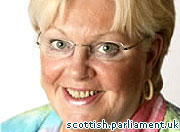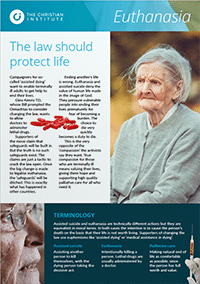A controversial attempt to legalise assisted suicide in Scotland is being supported by a humanist campaign group.
The End of Life Assistance (Scotland) Bill, proposed by independent MSP Margo MacDonald, would allow terminally ill people and those who are “permanently physically incapacitated” to seek assistance in ending their lives.
The Humanist Society of Scotland (HSS) has now launched a campaign backing Mrs MacDonald’s proposals, which have been plagued by controversy.
Signatures
Earlier this year Care Not Killing, an influential campaign group composed of churches, bioethicists, disability and medical groups, collected over 14,000 signatures against any weakening of the law.
But John Bishop, Secretary of the Humanist Society of Scotland, claimed widespread support for assisted suicide, saying: “Most British people support physician-assisted suicide, as reports compiled since the mid-90s have shown.
He added: “Therefore, we are disappointed that some of the objections to the bill voiced in the Care Not Killing campaign are ill-informed, deliberately misleading and quite irrational.”
Illegal
Mrs MacDonald, who also claims widespread support for her Bill, said: “My Bill rests on patient autonomy, will affect clearly-defined groups of people and entails a rigorous procedure and reporting.”
Assisted suicide is currently illegal in Scotland and anyone involved in assisting suicide may be charged with culpable homicide.
MSPs are due to begin hearing expert evidence on the controversial proposals next week.
Betray
In July a leading doctor warned that legalising assisted suicide would betray “Scottish values” for the benefit of a vocal few.
Dr Rosemary Barrett, Director of the Scottish Council on Human Bioethics, said: “The Bill is designed for people who believe their existence is ‘intolerable’. However, the truth is that Scotland offers excellent care for people suffering from extraordinary pain.
“Our palliative care services are capable of more than adequately managing physical pain. With such advanced medical services available, no person needs to experience ‘intolerable’ pain.”
Opposed
In June a Holyrood consultation revealed that many Scots remain steadfastly opposed to it.
The consultation revealed that 86 per cent of respondents, some 601 people and organisations, were opposed to the Bill.
And in April, 16 palliative care specialists attacked the Bill in an open letter to The Times newspaper.
Value
In the letter the medics warned that the Bill “sends a message to all disabled people and terminally ill patients that somehow because they are dependent on others they are of less value to our society and so may feel that they ought to choose to bring forward the time of their death.”
The medics also cautioned that “the proposed Bill may put pressure on some vulnerable people to make a choice they do not wish to make.”


